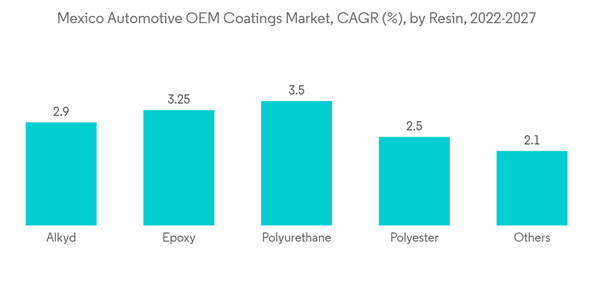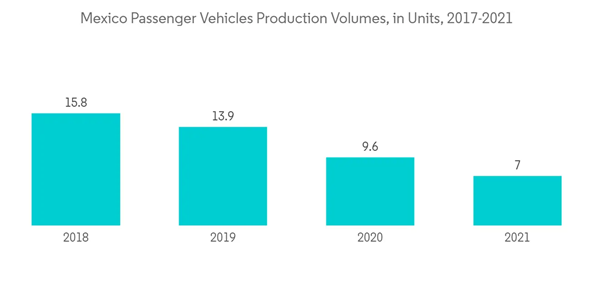The Mexico Automotive OEM Coatings Market was valued at USD 513 million at the end of the year and is projected to register a CAGR of 4.7% during the forecast period. The COVID pandemic negatively affected the automotive OEM coatings market as most automotive manufacturers closed their manufacturing activities. However, after Covid-19, automotive manufacturers resumed production work which helped to revive the market for automotive OEM coatings in the country.
This product will be delivered within 2 business days.
Key Highlights
- Over the long term, the major factor driving the market is the preference for personal transport. The consumer preference for private transport has grown over the recent years due to better development of roads and infrastructure, startup innovations in the car rental industry, and the availability of low-cost cars that are affordable for middle-class people.
- The harmful environmental impact of conventional coatings is expected to restrain the automotive OEM market in the country.
- The rising demand for electric vehicles offers various opportunities for market growth during the forecast period.
- In the application segment, the passenger vehicles segment is expected to dominate the market for automotive OEM coatings in the country.
Mexico Automotive OEM Coatings Market Trends
The Polyurethane Resins Segment to Register Significant Market Growth During the Forecast Period
- Polyurethane is a thermosetting resin that does not melt when heated. Polyurethane resin-based coatings are largely used in automotive OEM applications. These paints are usually applied over intermediates and primers to provide a lustrous and glossy finish while maintaining resistivity and providing excellent performance against high levels of UV and other extreme weather conditions in areas prone to high wear and resistivity toward a wide range of solvents.
- Polyurethane coatings are used in the automotive industry as these coatings can withstand environmental impacts such as water and salt or UV radiation. These coatings will help to maintain their superior appearance and high gloss over a long period of time. Also, resistance toward scratches is essential for an automotive clear coat.
- Automobile coatings include automobile primer, intermediate coat, and finishing paint. According to the coating process, 92% of primer uses cathodic electric deposit (CED). It includes 90% cathode electrophoretic paint. Polyurethane electrophoretic paint has excellent comprehensive performance. Thus, these are used as primers in automotive OEM applications.
- Polyurethane coatings are easily available in the market and preferred by manufacturing industries. The development of environment-friendly coatings with poly-aspartic and 2K waterborne PU technology has also opened up new avenues for growth.
- The increased use of polyurethane coatings, due to stringent government regulations for a greener and more sustainable environment, is expected to provide tremendous opportunities for market growth in Mexico in the coming years.
The Passenger Cars Application Segment to Dominate the Market
- Passenger cars are vehicles designed for the carriage of passengers and comprising no more than eight seats in addition to the driver’s seat. The passenger can carry a maximum mass of 3.5 tons.
- The automotive coatings are used for coating various interiors and exteriors of cars, such as center clusters, instrument panels, armrests, meter clusters, speaker grills, armrest bezels, steering wheels, door trim, and handles, and to coat the surface of automobiles for both protection of the vehicle's surface as well as to enhance its aesthetic appearance.
- Mexico is the sixth-largest global passenger vehicle manufacturer. 89% of vehicles produced in Mexico are exported, with 80% exported to the United States. In 2021, Mexico produced 708,242 passenger vehicles at a 27% production decline rate compared to 967,479 units produced in 2020. The high raw material prices, shortage of semiconductor chips, and other logistical factors have resulted in declined production of passenger vehicles in the country.
- However, the United States-Mexico-Canada Agreement (USMCA) has supported the development of new vehicles in the country. This factor is likely to boost the production and sales of passenger vehicles in the country.
- Ford announced an investment of USD 50 billion to increase electric vehicle production capacity at its assembly plant in Cuautitlan, State of Mexico. The company aims at tripling it's production capacity from 70,000 to 21,000 units. This will help to further strengthen passenger vehicles market in the country.
Mexico Automotive OEM Coatings Industry Overview
The Mexico automotive OEM coatings market is consolidated. Some major players in the market include (not in a particular order) Akzo Nobel N.V., Axalta Coating Systems, BASF SE, PPG Industries, Inc., and The Sherwin-Williams Company, among others.Additional Benefits:
- The market estimate (ME) sheet in Excel format
- 3 months of analyst support
This product will be delivered within 2 business days.
Table of Contents
1 INTRODUCTION
4 MARKET DYNAMICS
5 MARKET SEGMENTATION (Value in USD Million)
6 COMPETITIVE LANDSCAPE
7 MARKET OPPORTUNITIES AND FUTURE TRENDS
Companies Mentioned (Partial List)
A selection of companies mentioned in this report includes, but is not limited to:
- Akzo Nobel N.V.
- Axalta Coating Systems
- BASF SE
- Henkel AG & Co. KGaA
- Hemple A/S
- Jotun
- Mankiewicz Gebr. & Co.
- Nippon Paint Holdings Co., Ltd.
- PPG Industries
- Sika AG
- The Sherwin-Williams Company










